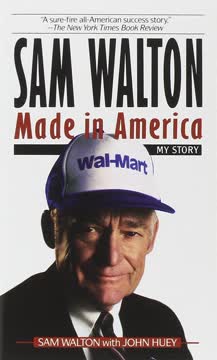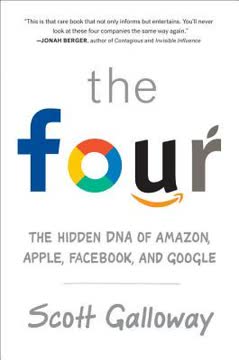Key Takeaways
1. Netflix's origin: From DVD-by-mail to streaming giant
"Nobody. Knows. Anything."
From idea to execution. Netflix began as a DVD-by-mail rental service in 1997, founded by Marc Randolph and Reed Hastings. The initial concept was born during their carpooling conversations, where they brainstormed various business ideas. They tested the viability of mailing DVDs by sending a CD to Hastings' house, which arrived intact. This simple experiment laid the foundation for what would become a revolutionary business model.
Overcoming challenges. The early days of Netflix were fraught with challenges, including:
- Limited DVD titles available (only 900 at launch)
- Skepticism from potential investors and partners
- Competition from established video rental chains like Blockbuster
Despite these obstacles, the founders persisted, refining their model and gradually building a customer base. The company's evolution from a DVD rental service to a streaming giant demonstrates the importance of adaptability and long-term vision in entrepreneurship.
2. Embrace failure and persistence in entrepreneurship
"If you really want to build an estate, own your own business. Control your own life."
Learning from setbacks. Randolph emphasizes the importance of embracing failure as a learning opportunity. The Netflix team experimented with various ideas, many of which failed, before landing on the successful subscription model. Some early failures included:
- Personalized shampoo delivery
- Custom baseball bat manufacturing
- VHS tape rental by mail
Persistence pays off. The founders' persistence in the face of repeated failures and skepticism was crucial to Netflix's eventual success. They continued to refine their ideas and business model, even when facing rejection from potential partners and investors. This persistence allowed them to outlast competitors and establish Netflix as a dominant player in the entertainment industry.
3. Focus on solving customer pain points
"Let's just try it. Mail a CD to your place. If it breaks, it breaks, and we know that this idea could never work. If it gets there, you got something to listen to on Tuesday night."
Identifying customer frustrations. Netflix's success stemmed from addressing key pain points in the traditional video rental experience:
- Late fees
- Limited selection
- Inconvenience of traveling to and from rental stores
Innovative solutions. To address these issues, Netflix introduced:
- No late fees
- A vast online catalog of titles
- Home delivery and return via mail
By focusing on customer needs and frustrations, Netflix created a service that was more convenient and enjoyable than existing options, leading to rapid customer adoption and growth.
4. The power of a subscription model in business
"People don't just like no late fees, a flat monthly rate, plus serialized delivery with a queue. They loved it."
Revolutionizing the industry. Netflix's introduction of a subscription model for DVD rentals was a game-changer. This model offered several advantages:
- Predictable recurring revenue for the company
- Improved customer experience with no per-rental fees
- Encouraged increased usage, leading to higher customer retention
Financial stability. The subscription model provided Netflix with a more stable financial foundation compared to the traditional pay-per-rental model. It allowed the company to better predict revenue and invest in growth and content acquisition.
5. Building a culture of radical honesty and freedom with responsibility
"Culture isn't what you say. It's what you do."
Fostering open communication. Netflix developed a culture of radical honesty, encouraging employees to speak their minds and provide direct feedback. This approach:
- Promoted innovation and problem-solving
- Reduced office politics and hidden agendas
- Created a more efficient and transparent work environment
Empowering employees. The company also embraced a "freedom with responsibility" philosophy, giving employees significant autonomy in their work. Key aspects included:
- No formal vacation policy
- Flexible work arrangements
- Trust in employees to make decisions that benefit the company
This culture attracted top talent and fostered a high-performance environment that contributed significantly to Netflix's success.
6. Adapt or die: Pivoting in response to market changes
"Forget the landing pages. We're redesigning the site anyway."
Recognizing market shifts. Netflix's ability to adapt to changing market conditions was crucial to its survival and growth. Key pivots included:
- Transitioning from a DVD rental and sales model to rental-only
- Shifting from à la carte rentals to a subscription model
- Investing in streaming technology before it was mainstream
Embracing new technologies. The company's foresight in recognizing the potential of streaming technology and investing in it early on positioned Netflix to lead the transition from physical media to digital content delivery.
7. The importance of data-driven decision making
"We called this ruthless streamlining scraping barnacles off the hull."
Leveraging customer data. Netflix's success was largely driven by its ability to collect and analyze vast amounts of customer data. This data-driven approach informed:
- Content recommendations (Cinematch algorithm)
- User interface design
- Content acquisition decisions
Continuous improvement. The company used A/B testing extensively to refine its service and user experience. This commitment to data-driven decision making allowed Netflix to continuously improve its offering and stay ahead of competitors.
8. Scaling challenges: From startup to public company
"We were drowning in our own success."
Managing rapid growth. As Netflix expanded, it faced numerous scaling challenges:
- Building infrastructure to support millions of users
- Developing efficient DVD distribution systems
- Managing increasing content acquisition costs
Financial pressures. The company's rapid growth also created financial strains, as the costs of acquiring new customers and expanding inventory often outpaced revenue growth. This led to difficult decisions, including layoffs and restructuring, to achieve profitability and prepare for an IPO.
9. The value of strategic partnerships in business growth
"Steve Nickerson had glimpsed and believed. And it was already paying off."
Leveraging partnerships. Netflix's early partnerships with DVD player manufacturers like Toshiba and Sony were crucial to its growth. These partnerships:
- Provided access to new DVD player owners
- Increased brand awareness
- Helped establish Netflix as a leader in the DVD rental market
Navigating relationships. The company had to carefully manage these partnerships, balancing the benefits with the potential risks of becoming too dependent on any single partner.
10. Balancing innovation with financial sustainability
"We'd survived. We were hitting our goals. But things were different."
Investing in the future. While focusing on its DVD rental business, Netflix also invested in developing its streaming capability, recognizing it as the future of content delivery. This required:
- Significant financial investment
- Negotiating with content providers for streaming rights
- Developing new technology infrastructure
Financial discipline. Balancing these investments with the need for financial sustainability was a constant challenge. The company had to make tough decisions about resource allocation and cost management to ensure it could fund its future growth while maintaining its core business.
Last updated:
FAQ
What's That Will Never Work about?
- Founding Story of Netflix: The book details the journey of Marc Randolph and Reed Hastings as they establish Netflix, highlighting the challenges and successes in its early days.
- Entrepreneurial Insights: Randolph shares personal anecdotes and reflections on entrepreneurship, focusing on resilience and adaptability.
- Lessons on Innovation: It explores the evolution of ideas, showing how Netflix's initial concept transformed into a successful DVD rental service.
Why should I read That Will Never Work?
- Inspiration for Entrepreneurs: The book offers valuable insights for aspiring entrepreneurs, demonstrating the grit needed to turn an idea into a successful business.
- Real-World Lessons: Readers can learn practical lessons about navigating the startup landscape, including market research and customer feedback.
- Unique Perspective: Randolph provides a behind-the-scenes look at the tech industry in the late 1990s, appealing to those interested in Silicon Valley's history.
What are the key takeaways of That Will Never Work?
- Embrace Failure: Randolph emphasizes learning from failure as a crucial part of the entrepreneurial journey.
- Focus on the Customer: Understanding customer needs is vital for product development and business strategy.
- Adaptability is Key: Entrepreneurs must be willing to pivot based on market feedback and changing circumstances.
What are the best quotes from That Will Never Work and what do they mean?
- “Distrust epiphanies.”: Great ideas develop gradually through hard work and iteration, not sudden inspiration.
- “Your attachment to this idea isn’t strictly rational.”: Emotional investment in ideas can cloud judgment and lead to poor decisions.
- “Culture isn’t what you say. It’s what you do.”: Company culture is established through actions, not just words.
How did Netflix evolve from an idea to a successful business?
- Initial Pitches: Randolph pitched various ideas, including personalized products, which initially failed.
- Discovery of DVDs: Recognizing DVDs' potential as a rental medium was a turning point.
- Focus on Rentals: Pivoting to focus solely on rentals differentiated Netflix from competitors.
What challenges did Randolph and Hastings face while starting Netflix?
- Skepticism from Others: Many doubted the viability of their idea, including Randolph’s wife.
- Operational Hurdles: They faced logistical challenges like managing inventory and shipping logistics.
- Market Competition: They contended with larger competitors like Blockbuster and Amazon.
What role did company culture play in Netflix's success?
- Freedom and Responsibility: Trusting employees to make decisions fostered innovation and accountability.
- Hiring for Fit: The team was selected for skills and cultural fit, ensuring a shared vision.
- Adaptability and Growth: The culture encouraged continuous learning and adaptation.
How did Netflix handle customer acquisition in its early days?
- Promotional Partnerships: Collaborations with DVD player manufacturers helped attract new customers.
- Community Engagement: Engaging with online communities generated buzz and attracted early adopters.
- Focus on User Experience: A user-friendly website enhanced customer satisfaction.
What strategies did Netflix use to differentiate itself from competitors?
- Comprehensive Inventory: Aiming for the largest selection of DVDs ensured customer satisfaction.
- Convenience of Delivery: Mailing DVDs directly to customers eliminated trips to video stores.
- Customer-Centric Approach: Understanding customer preferences helped tailor offerings and improve retention.
How did Marc Randolph and Reed Hastings work together at Netflix?
- Complementary Skills: Randolph’s creativity and marketing paired with Hastings’ operational expertise.
- Radical Honesty: Open communication and constructive debates refined ideas and drove progress.
- Shared Vision: Both were committed to creating a unique customer experience.
How did Netflix innovate its business model?
- Subscription Service: The shift to a subscription model eliminated late fees and increased retention.
- Cinematch Algorithm: Personalized recommendations helped customers discover movies they would enjoy.
- Next-Day Delivery: A reflection-point shipping model offered next-day delivery, enhancing satisfaction.
What lessons can entrepreneurs learn from That Will Never Work?
- Adaptability is Key: Entrepreneurs must pivot and adjust strategies based on feedback and circumstances.
- Value of Teamwork: A strong, collaborative team can lead to innovative solutions and success.
- Persistence Pays Off: Perseverance and learning from failures are crucial for entrepreneurial success.
Review Summary
That Will Never Work receives mostly positive reviews for its engaging storytelling and insights into Netflix's early days. Readers appreciate Randolph's candid account of startup challenges, company culture, and pivotal decisions. Many find it inspiring for entrepreneurs. Some criticize the book's length and Randolph's self-promotion. A few reviewers question the narrative's completeness or relevance. Overall, most readers enjoy the blend of business lessons and personal memoir, praising Randolph's writing style and the book's entertainment value.
Similar Books










Download PDF
Download EPUB
.epub digital book format is ideal for reading ebooks on phones, tablets, and e-readers.




